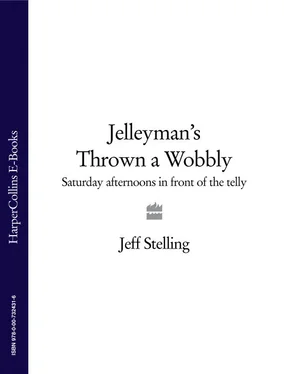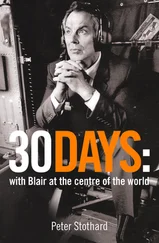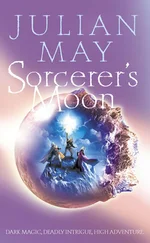You will, of course, start by explaining that this football programme doesn't show any real, actual football. There are no goals, shots or near misses on the telly, so it's a bit like watching Derby County. You'll explain that the closest things to action are the replays of last week's goals in three hours of football analysis, discussion and general messing about that precedes the 90 minutes of match drama on a Saturday afternoon. And that the real drama takes place as the latest scores and events stream onto the TV screen on a computerized videprinter, while four men of varying ‘expertise’ – all of them former professional footballers – sit in front of TV screens displaying their designated matches, pull on headphones, and relay the afternoon's action with a series of gasps, groans, girly yelps and ‘Oh, oh, no, oh, ooooohs!’
You'll probably confuse your enthralled audience further by adding that the roll-call of experts includes a former football playboy (‘Champagne’ Charlie Nicholas), a one-eyed Liverpool fan and former England captain (Phil ‘Thommo’ Thompson), a former Southampton legend who dated an Australian soap legend (Matt ‘Le Tiss’ Le Tissier), and a controversial midfielder who once shared a house with Gazza and could be considered as a football equivalent to Amy Winehouse (Paul ‘Merse’ Merson).
But hang on a second! Curtail their confusion by explaining that this car crash of information, goals, bookings, red cards, referee blunders and substitutions is held together by ‘Jeff's masterful handling of the latest football results’ ( GQ magazine, apparently – many thanks), as somehow, drawing all this together with a relatively calm head and a prayer to the TV gods, I perch on a precarious chair at the end of a desk as ‘anchorman’, with some notes and a dossier of information by way of reference while making some semblance of order from the chaos going on around the country.
Sounds strange when explained this way, doesn't it? But bizarrely, in this format, Soccer Saturday has drawn a cult following of fans, which is probably unsurprising given that, between the hours of three o'clock and four forty-five on a Saturday afternoon, it is the only place to receive a continual stream of match-related stats, facts and trivia, without suffering whatever it is Peter Schmeichel is waffling on about on BBC One. And if you haven't got a satellite dish, or even a cheap digital package from the local supermarket (shame on you), then you may have seen my mug gurning from a TV in your local Dixons as you've traipsed around the shops and peered at the half-time scores. This, if you are uninitiated to the programme (and if that's the case, I can only assume that you've been bought this book as a badly-planned present from a none-too-popular auntie), is Soccer Saturday . Hopefully you'll enjoy the show, and thanks for watching.
Calling The Oracle
How the Soccer Saturday concept came about now requires a back story of desperate measures, ill-conceived ideas, boozy escapades and Mark Lawrenson's unusual taste in waistcoats. Though by way of a full explanation, it's probably best if I take you back to a time before Sky Sports, when, in the olden days, there was only Ceefax or, if you were really unlucky, Oracle, to deliver live football scores on the telly. For anyone reading this under the age of 25, you may want to imagine Ceefax as a low-tech internet. Visualize a text-based service on your telly, only in colours more garish than a Norwich City away kit and with none of the speed or convenience of broadband, no pictures, no movies and certainly none of the mucky films. Instead, think graphics so big your granny could read them without her NHS specs, delivering the bare bones of a news story all served at a snail's pace. Forget high-speed connections: if you wanted live football results on a Saturday afternoon, you were probably sitting in front of the telly waiting for the system to scroll through 23 screens of information (the old First Division down to the Scottish lower leagues) with each page turning over every 45 seconds. It was a painful business.
Of course, you could have listened to the radio for results, but this presented another minor headache. In the good old days, the major stations would only focus on the biggest matches of the afternoon, with the odd result from the old Second Division thrown in. So there you were, driving home, listening out for the Crystal Palace versus Grimsby score in Division Two, and instead you're having to listen to a live commentary of Sheffield Wednesday versus Nottingham Forest (like I say, it was a long time ago) in the old Division One. Smart alecs might claim that local radio delivered the more specialized commentary services, but it was unlikely that Hull City's local station would pay much lip service to anyone interested in the scores away from their former stadium, Boothferry Park, so if you had a passing interest in anything happening further up the table, you were in trouble.
Something, clearly, had to give. And that something was dignity …
The Big Bang, Crash, Wallop Theory
To anyone with a bit of media savvy, there was clearly a huge audience requiring a wide range of football info in one place, delivered by a dashing anchorman at fast speeds. Somehow, we arrived at the show we all know and love today, though it hasn't always been called Soccer Saturday , a football show without any live football to watch. Its predecessor was Sports Saturday , a sports show without any sport to watch. This was originally presented by Paul Dempsey, a rather charming man who has now gone to the dark side of Setanta, I believe. Not that I ever watch it, mind. Anyway, my job was to appear on the show once every three weeks as a reserve anchorman, which was a blessing because Sports Saturday was a hideous show and would really only pay lip service to football.
When we did mention ‘the beautiful game’, former Liverpool defender Mark Lawrenson was invited onto the programme as our football expert. For whatever reason, ‘Lawro’ would usually wear the worst waistcoats you had ever seen. At times it was hard not to imagine that he'd dressed in the dark. In his garish fashions, he would talk in the studio for 20 minutes and discuss the day's big games. Then at four thirty - because there seemed to be an unwritten rule on TV at that time that the football scores should start to appear at four thirty - the results would trickle in.
It was a pretty shoddy service, because nobody had kept in touch with the scores throughout the afternoon. If you were a viewer, you had no idea what was going on in any of the games. If you were a presenter, it was highly possible that you were just as confused. It really was a mind-boggling format. Meanwhile, Sky in those days had very little in the way of live sport, apart from the football on a Sunday, which was their big selling point. As a result we would fill Sports Saturday with absolute twaddle or unique features. In fact, some of the so-called ‘features’ I would have to present are burned in my memory.
For example, one afternoon somebody had the bright idea of inviting a synchronized swimming team into the studio. The brief was for the team of a dozen girls to work through their competitive routines, complete with swimming caps, nose pegs, the works. Thankfully we were without water, which for safety reasons would have proved disastrous, but the movements and routines were just as disorientating. For anyone in the studio it was like watching the back four of any team managed by Kevin Keegan as they paraded around the floor inelegantly, waving their arms around and pretending to swim. Anyone actually viewing from the safety of their sofas must have thought, ‘What the bloody hell is this?’ I must admit, I remember shifting uncomfortably in my seat and thinking, ‘What the bloody hell is this?’ myself.
Читать дальше












